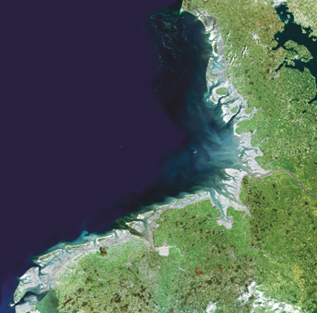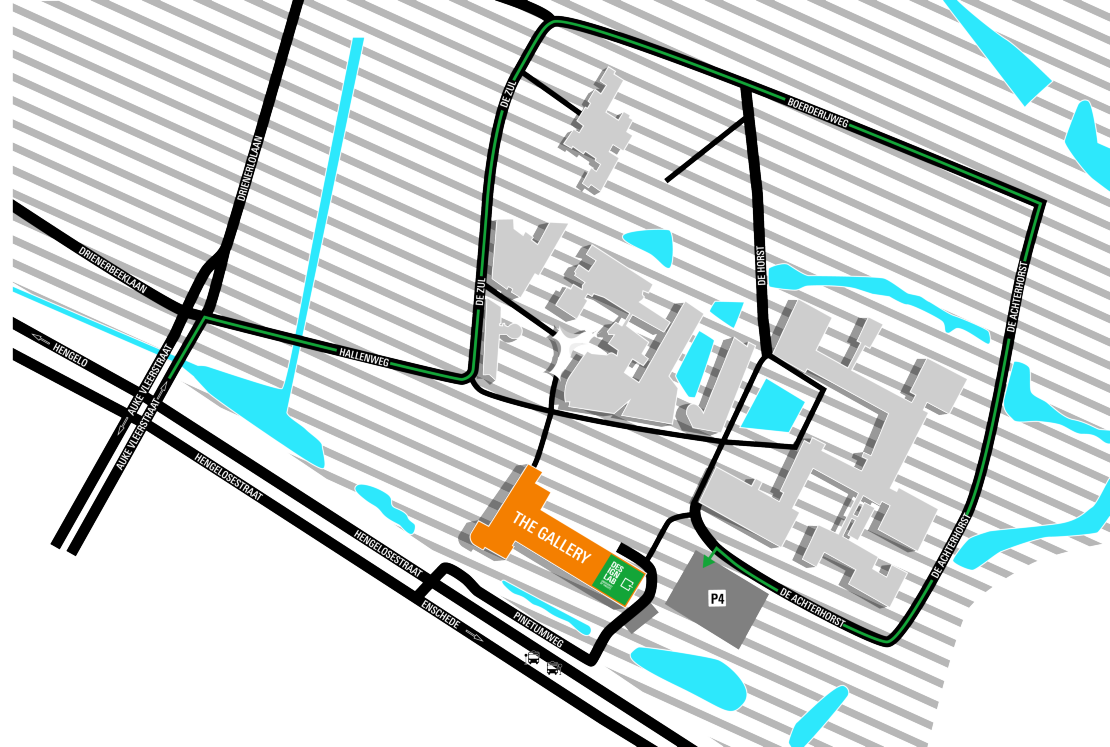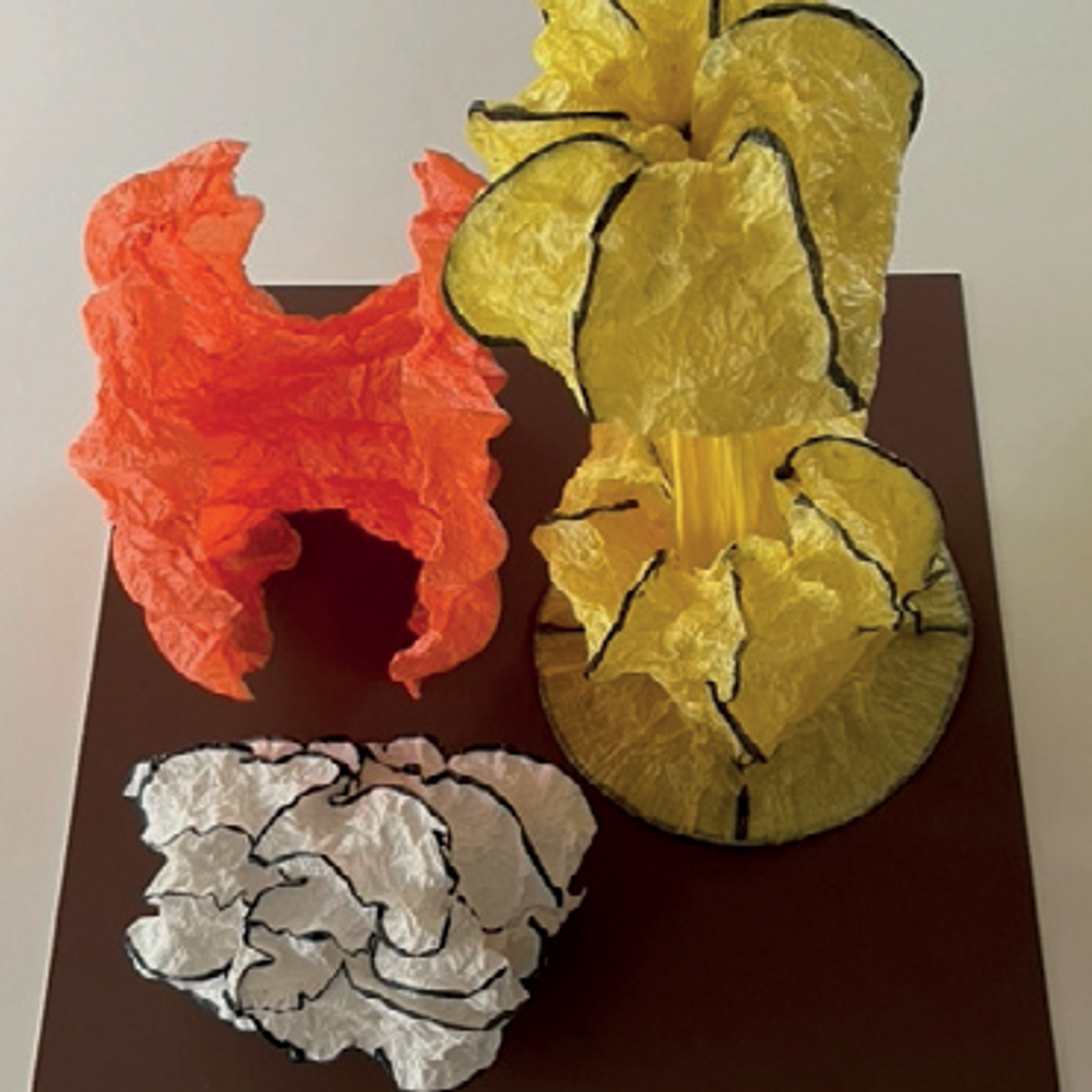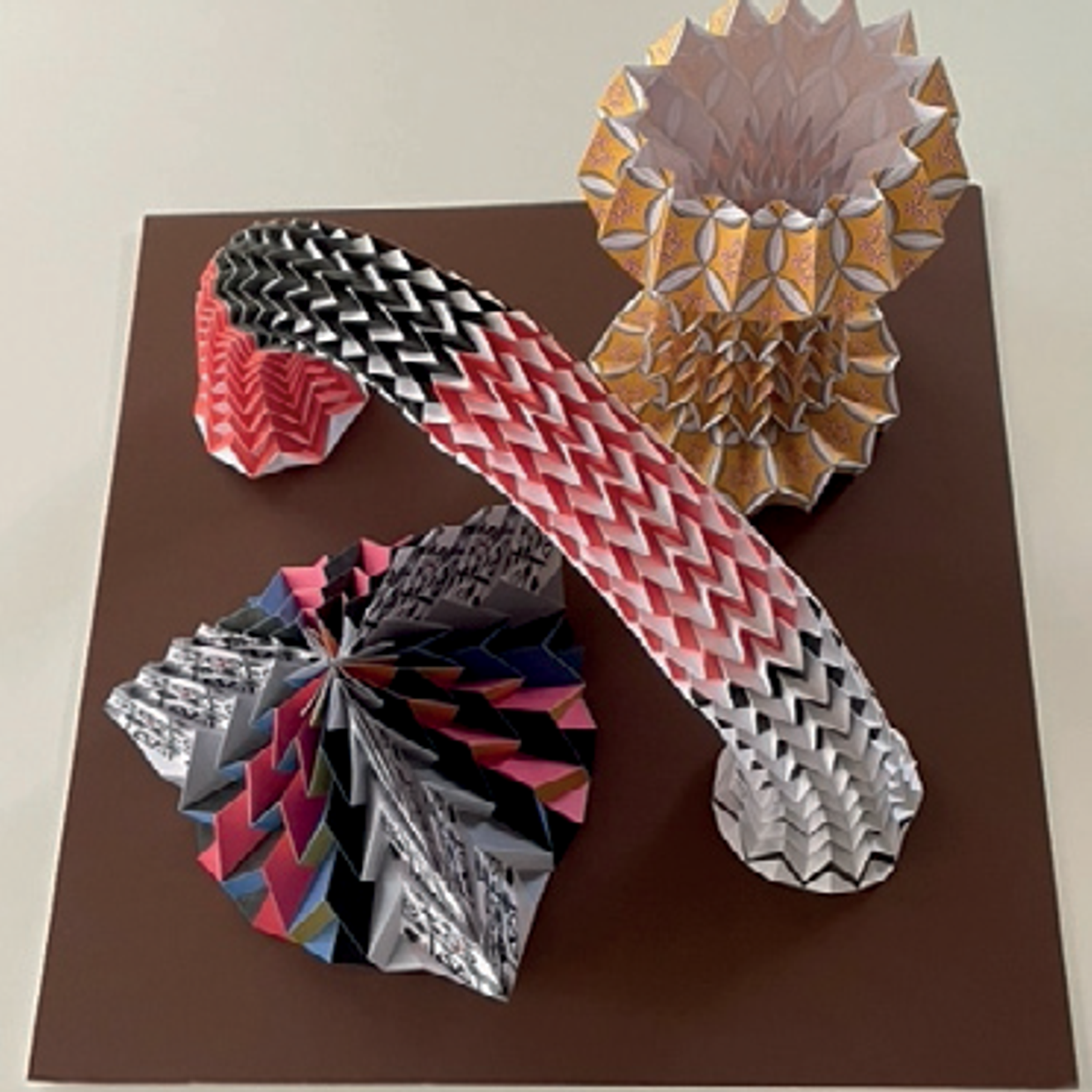de internationale wiskundetentoonstelling imaginary komt opnieuw naar de campus van 1 t/m 18 november
IMAGINARY is een interactieve, reizende tentoonstelling die het hele schooljaar 2022-2023 tegelijk in Nederland en Vlaanderen bezocht en beleefd kan worden. De tentoonstelling bestaat uit interactieve installaties, 3D-objecten en hun theoretische achtergrond in de algebraische meetkunde. Dit alles samengebracht op een aantrekkelijke en begrijpelijke manier. IMAGINARY komt vanaf 1 november drie weken lang naar de UT-campus.
De tentoonstelling wordt op dinsdag 1 november geopend met een lezing door Henk van der Vorst emeritus professor Numerical Analysis (UU).
VOOR WIE IS HET?
Iedereen is van harte welkom tijdens de tentoonstelling. Speciaal voor klassen (4-5 havo en 4-6 vwo) is er een onderwijsprogramma met een workshop en rondleiding. Op 1 november organiseert Studium Generale, samen met Abacus (studievereniging Toegepaste Wiskunde) en Daedalus (studievereniging Industrieel Ontwerpen) een lezing over Geometrische Origami. De lezing wordt verzorgd door Henk van der Vorst, emeritus professor Numerical Analysis (UU), wiens werk ook te bezichtigen is tijdens de tentoonstelling. Zie voor meer informatie: Geometrische origami (utwente.nl)
Algemeen publiek - 12:45 - 17:30 uur
Van maandag t/m vrijdag kunt u de tentoonstelling bezoeken van 12.45 - 17.30 uur. U kunt hierbij uitleg krijgen of een echte rondleiding in groepen van maximaal 25 personen. Deze rondleidingen worden verzorgd door studenten van de University of Twente. De tentoonstelling is te vinden in het DesignLab. U kunt uiteraard gratis naar binnen.
Scholierenprogramma - 13:30 - 16:00 uur
Inschrijven is verplicht!
Speciaal voor leerlingen van 4-5 havo en 4 t/m 4-6 vwo is er een programma ontwikkeld om te inspireren en motiveren met wiskunde bezig te zijn. Het programma bestaat uit de volgende onderdelen:
Workshop Origami & Wiskunde. Origami is de eeuwenoude kunst van het vouwen van papier. Maar eigenlijk is het zo veel meer. Wist je bijvoorbeeld dat origami nauw verbonden is met wiskunde? En dat je de toepassingen van origami op verrassende plekken terug kunt zien? Denk bijvoorbeeld aan de ruimtevaart, de biomedische technologie of productdesign. Tijdens de workshiop Origami & Wiskunde leer je meer over het verband tussen origami en wiskunde en zie je een aantal voorbeelden van dichtbij. Daarnaast ga je ook zelf actief aan de slag met papier en leer je verschillende vouwtechnieken zelf toe te passen.
IMAGINARY rondleiding. Naast een workshop, bestaat het programma uit een rondleiding, onder begeleiding van een student. Er is uitgebreid de tijd om rond te kijken en vragen te stellen.
Kosten: €250,-
AANMELDEN?
Voor het programma kunt u een hele klas in één keer inschrijven, zodat wij direct op de hoogte zijn van het aantal leerlingen dat we mogen verwelkomen. Per dag bieden wij ruimte aan één klas (max. 30 leerlingen) om de tentoonstelling en workshops te bezoeken. Na inschrijving ontvangt u zo snel mogelijk bericht van ons. Pas na een officiële bevestiging is het door u gekozen moment definitief.
Lunchlezingen over de kracht van wiskunde (voertaal Engels) - 12.45 - 13.30 uur
Naast de reizende wiskundetentoonstelling IMAGINARY is er een serie lunchlezingen door onderzoekers uit de toegepaste wiskunde en technische disciplines die veel gebruik maken van wiskunde. De lezingen zijn gericht op een breed publiek. Alle lunchlezingen worden in het Engels verzorgd.
Dinsdag 3 november | Connecting with the Coast | Dr ir Pieter Roos
Lunch Presentation by Dr ir Pieter Roos, alumnus of Applied Mathematics, currently Civil Engineering, University of Twente
Friday 4 november. 12.45-13.30 hrs
DesignLab: Room Inform
Titel: Connecting with the Coast
Abstract: Barrier coasts, such as the Wadden Sea, cover about 10% of the world’s coastline.
They consist of a chain of barrier islands separated by inlets that connect an inner basin with the outer sea.
Next to their importance for society, barrier coasts are also fascinating dynamic systems continuously evolving due to the motion of water and sediment (for example in response to climate change and human intervention).
Pieter Roos will show how mathematics can help us better understand the complexities of barrier coasts, specifically the stability of and connectivity among tidal inlets.

Satellietbeelden Waddenzee
Dinsdag 8 november | Benfod's Law | Prof ir Gjerrit Meinsma
Lunch Presentation by Dr ir Gjerrit Meinsma Applied Mathematics University of Twente
Tuesday 8 November, 12:45-13:30
DesignLab: Room Inform
Titel: Benford's Law
Abstract:
There is a funny thing with numbers in real life, such as river lengths and city populations: almost one third of the numbers has leading digit 1! How can that be? I will explore one possible explanation of this phenomenon, based on "Nexit" which is the (hypothetical) problem of the Netherlands leaving the euro. This leads to Benford's Law. This law is used to detect anomalies in company data because fake data typically does not satisfy Benford's Law.
Vrijdag 11 november | The Power of Math in (Teaching) Machine Dynamics | Dr ir Jurnan Schilder
Lunch Presentation by Dr ir Jurnan Schilder, Applied Mechanics & Data Analysis, University of Twente
Friday 11 November, 12:45-13:30
DesignLab: Room Inform
Titel: The Power of Math in (Teaching) Machine Dynamics
Abstract:
How do machines move when subjected to forces? Or what forces should we apply to a machine in order to make it behave as desired? In many of our study programs, courses in mechanics and dynamics teach students how answer such questions based on the physics of Newton’s laws of motion. In this lecture, you will participate in an experiment that is about importance of math in engineering. Mechanical engineer Jurnan Schilder will deliver his worst ever lecture on machine dynamics, in which the majority of the math is omitted. Based on how little you learn in this lecture, Jurnan explains the didactical advantages of starting each problem in machine dynamics with the relevant math. At the end of this lecture, you will have an increased appreciation of the power of math over the physical laws required to solve problems in machine design. And just maybe, you learn something on machine dynamics along the way.
Maandag 14 november | Algorithms | Prof dr Mariëlle Stoelinga
Lunch Presentation by Prof dr Mariëlle Stoelinga, Formal Methods and Tools, University of Twente
Monday 14 November, 12:45-13:30
DesignLab: Room Inform
Titel: Algorithms
Abstract:
Algorithms, you hear about them more and more often. They determine what you watch on YouTube, what you find on Google and they are a key component in self-driving cars. The Dutch Parliament has even proposed to impose a reporting requirement for algorithms, attempting to prevent abuses such as the discriminating decisions, eg in the "Toeslagenaffaire".
But what exactly are algorithms? How do they work? What is their predictive power and what are their downsides?
In this lunch lecture, Prof. Mariëlle Stoelinga (Professor of Risk Management for High-Tech Systems, UT) will talk about the ins and outs of algorithms.
Dinsdag 15 november | Healthy Care | Prof dr Richard Boucherie
Lunch Presentation by Prof dr Richard Boucherie, Mathematics of Operations Research , University of Twente
Tuesday 15 November, 12:45-13:30
DesignLab: Room Iform
Titel: Healthy Care
Abstract:
Nurses that work in hospitals are often either running or standing still. Some days twenty patients arrive at their ward, while the next day this may be only five. How to cope with this as a team? When the number of patients changes every day, how can you predict the number of nurses required for adequate care?
This can be done with mathematical models and data. Hospitals plan surgeries several weeks in advance and know how long patients usually stay. With this information and probabilistic methods, it is possible to forecast when it will be busy or calm.
This allows scheduling less nurses on calm moments and more during busy times. Working smarter, not harder.
Woensdag 16 november | How mathematics can help us understand AI | Prof dr Johannes Schmidt-Hieber
Lunch Presentation by Prof dr Johannes Schmidt-Hieber, Mathematics of Operations Research , University of Twente
Wednesday 16 November, DesignLab: Room Iform
Titel: How mathematics can help us to understand AI
Abstract:
Artificial intelligence procedures are often referred to as black box methods. These methods seem to be so complicated that we cannot understand them anymore. Nevertheless, a good understanding is necessary to guarantee proper functioning. During the talk we will describe the challenges and the progress that has been made recently regarding the formation of a new field within mathematics that aims to unravel the mystery behind AI procedures.
Donderdag 17 november | Music, Networks & Mathematics | Dr ir Clara Stegehuis
Lunch lecture by Dr ir Clara Stegehuis, Department of Applied Mathematics, University of Twente
Thursday 17 november. 12.45 - 13.30 hrs
DesignLab: Room Inform
Who is the most popular musician? And how do musicians form collaborations? We will explore these questions by using mathematics and network science, and find out how Harry Potter and Wikipedia can explain why some songs are more popular than other.
Vrijdag 18 november | Statistics to the stars and back: How we can use mathematics and statistics to unravel the secrets of our Universe | Dr Katharina Proksch
Lunch Presentation by Dr Katharina Proksch, Mathematics of Operations Research , University of Twente
Friday 18 November, DesignLab: Room Inform
Titel: Statistics to the stars and back: How we can use mathematics and statistics to unravel the secrets of our Universe
Abstract:
How did the Universe evolve? What is its (large scale) structure? Are there more habitable Earth-like planets and how can we find them? These and related questions have made people wonder and marvel for ages. Mathematics is an integral part of the quest of finding answers and unraveling the secrets of the Universe. In this talk we will have a look at several astrophysical and cosmological phenomena and the mathematics behind their discoveries.
DE TENTOONSTELLING BEZOEKEN
Van maandag t/m vrijdag kunt u de tentoonstelling bezoeken van 12.45 - 17.30 uur. U kunt hierbij uitleg krijgen of een echte rondleiding in groepen van maximaal 25 personen. Deze rondleidingen worden verzorgd door studenten van de University of Twente. De tentoonstelling is te vinden in het DesignLab. U kunt uiteraard gratis naar binnen.
Hebt u nog vragen?
- Voor informatie over inschrijving van klassen of het programma of de workshops kunt u terecht bij Lotte Weedage
- Voor algemene informatie kunt u terecht bij Jan Willem Polderman
PARKEREN & ROUTEBESCHRIJVING
Kom ons bezoeken! Klik op de afbeelding hieronder voor een beschrijving van waar je ons kunt vinden op de campus van de Universiteit Twente, en hoe je ons kunt bereiken met de auto, de fiets of het openbaar vervoer.

 vr 6 mrt 2026 12:30 - 13:30Promotie Ranasinghe Wijesundara Ranasinghe Appuhamilage| CMOS Transistor-Topology Engineering for Minimal-Energy Near-Threshold Computing | Exploring Alternative Logic Styles for Low-Energy IoT Devices
vr 6 mrt 2026 12:30 - 13:30Promotie Ranasinghe Wijesundara Ranasinghe Appuhamilage| CMOS Transistor-Topology Engineering for Minimal-Energy Near-Threshold Computing | Exploring Alternative Logic Styles for Low-Energy IoT Devices ma 23 mrt 2026 14:30 - 15:30Promotie Riccardo Tambone | Dynamic effects in silicon power MOSFETs
ma 23 mrt 2026 14:30 - 15:30Promotie Riccardo Tambone | Dynamic effects in silicon power MOSFETs wo 25 mrt 2026 14:30 - 15:30Promotie Sven Dummer | Deep Learning with Infinite-Dimensional Priors
wo 25 mrt 2026 14:30 - 15:30Promotie Sven Dummer | Deep Learning with Infinite-Dimensional Priors do 28 mei 2026 09:30 - 17:304TU.Health Event 2026
do 28 mei 2026 09:30 - 17:304TU.Health Event 2026 ma 14 - wo 16 sep 2026AM-SMART-conferentie 2026
ma 14 - wo 16 sep 2026AM-SMART-conferentie 2026





